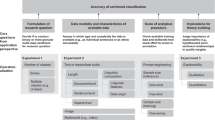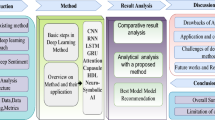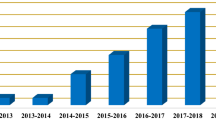Abstract
A personality is a blend of an individual’s psychological characteristics and qualities, displaying human behaviour. Recently, the development of computational models for personality recognition has received research scientists’ attention. Prior studies on personality trait prediction have used machine and deep learning techniques, which perform feature extraction but do not retain long-term dependencies. In this study, we apply a deep learning model, namely BiLSTM, that can maintain long-term dependencies in both forward and backward directions for personality prediction on a benchmark essay dataset. The suggested model outperforms current strategies in classifying the user’s personality attributes. With this research’s findings, firms may make better judgments about hiring personnel. They may also use the research findings to choose, manage, and optimize their strategies, activities, and commodities.
















Similar content being viewed by others
Data Availability
The supplementary data used to support the findings of this study are included with the manuscript and can also availed from the first author upon request.
References
Majumder N, Poria S, Gelbukh A, Cambria E (2017) Deep Learning-Based Document Modeling for Personality Detection from Text. IEEE Intell Syst 32(2):74–79. https://doi.org/10.1109/MIS.2017.23
Sharma S, Kumar P, Kumar K (2017) LEXER: LEXicon based emotion AnalyzeR. In: Lecture notes in computer science. Springer International Publishing, pp 373–379
Ahmad H, Asghar MU, Asghar MZ, Khan A, Mosavi AH (2021) A Hybrid Deep Learning Technique for Personality Trait Classification From Text. IEEE Access 9:146214–146232. https://doi.org/10.1109/ACCESS.2021.3121791
Golbeck, J, Robles, C, Edmondson, M, Turner, K (2011) Predicting personality from twitter. In 2011 IEEE third international conference on privacy, security, risk and trust and 2011 IEEE third international conference on social computing. IEEE (pp. 149-156). https://doi.org/10.1109/PASSAT/SocialCom.2011.33
Gjurković, M, Šnajder, J (2018) Reddit: A gold mine for personality prediction. In Proceedings of the second workshop on computational modeling of people’s opinions, personality, and emotions in social media. New Orleans, Louisiana, USA. Association for Computational Linguistics (pp. 87-97). https://doi.org/10.18653/v1/W18-1112
Choong EJ, Varathan KD (2021) Predicting judging-perceiving of Myers-Briggs Type Indicator (MBTI) in online social forum. PeerJ 9(e11382):e11382. https://doi.org/10.7717/peerj.11382
Kumar K (2023) R3 N2: a novel approach for review based custom star rating using recurrent neural network. J Ambient Intell Humaniz Comput 14(7):9089–9097
Kumar A, Purohit K, Kumar K (2021) Stock price prediction using recurrent neural network and long short-term memory. In: Conference Proceedings of ICDLAIR2019. Springer International Publishing, pp 153–160
Kumar S, Kumar K (2018) IRSC: integrated automated review mining system using virtual machines in cloud environment. 2018 Conference on Information and Communication
Ansari H, Vijayvergia A, Kumar K (2018) DCR-HMM: depression detection based on content rating using hidden markov model. 2018 Conference on Information and Communication Technology (CICT)
Khan AS, Ahmad H, Zubair M, Khan F, Arif A, Ali H (2020) Personality classification from online text using machine learning approach. Int J Adv Comput Sci Appl 11(3). https://doi.org/10.14569/ijacsa.2020.0110358
Sharma S, Kumar K, Singh N (2022) Deep eigen space based ASL recognition system. IETE J Res 68(5):3798–3808
Bharadwaj, S, Sridhar, S, Choudhary, R, Srinath, R (2018) Persona traits identification based on Myers-Briggs Type Indicator (MBTI)-a text classification approach. In 2018 international conference on advances in computing, communications and informatics (ICACCI) (pp. 1076-1082). IEEE. https://doi.org/10.1109/ICACCI.2018.8554828
Kumar K, Kurhekar M (2017) Sentimentalizer: docker container utility over cloud. 2017 Ninth International Conference on Advances in Pattern Recognition (ICAPR)
Dhiman A, Kumar D (2018) Sentiment analysis approach based N-gram and KNN classifier. Int J Comput Appl 182(4):29–32. https://doi.org/10.5120/ijca2018917513
Chaudhary S, Sing R, Hasan ST, Kaur I (2018) A comparative Study of Different Classifiers for Myers-Brigg Personality Prediction Model. IRJET 05:1410–1413
Ilmini WMKS, Fernando TGI (2023) Explaining the Outputs of Convolutional Neural Network-Recurrent Neural Network (CNN-RNN) based Apparent Personality Detection Models using the Class Activation Maps. Int J Adv Comput Sci Appl 14(2):25–36. https://doi.org/10.14569/IJACSA.2023.0140224
Ramezani, M, Feizi-Derakhshi, MR, Balafar, MA (2022) Knowledge graph-enabled text-based automatic personality prediction. Comput Intell Neurosci, 2022. https://doi.org/10.1155/2022/3732351
Kim, KY, Yang, YB, Kim, MR, Park, JS, Kim, J (2023) Mbti Personality Type Prediction Model Using Wzt Analysis Based On The Cnn Ensemble And Gan. Hum-Centric Comput Inf Sci, 13. https://doi.org/10.22967/Hcis.2023.13.014
Quwaider M, Alabed A, Duwairi R (2023) Shooter video games for personality prediction using five factor model traits and machine learning. Simul Model Pract Theory 122:102665. https://doi.org/10.1016/j.simpat.2022.102665
Yang K, Lau RYK, Abbasi A (2023) Getting Personal: A Deep Learning Artifact for Text-Based Measurement of Personality. Inf Syst Res 34(1):194–222. https://doi.org/10.1287/isre.2022.1111
Maqsood R, Ceravolo P, Romero C, Ventura S (2022) Modeling and predicting students’ engagement behaviors using mixture Markov models. Knowl Inf Syst 64(5):1349–1384
Vijayvergia A, Kumar K (2021) Selective shallow models strength integration for emotion detection using GloVe and LSTM. Multimed Tools Appl 80(18):28349–28363
Asghar MZ, Lajis A, Alam MM, Rahmat MK, Nasir HM, Ahmad H, Al-Rakhami MS, Al-Amri A, Albogamy FR (2022) A deep neural network model for the detection and classification of emotions from textual content. Complexity 2022:1–12. https://doi.org/10.1155/2022/8221121
Pedregosa F, Varoquaux G, Gramfort A et al (2011) sklearn. Model selection. Train-Test-Split J Mach Learn Res 12:2825–2830
Shah, T (2017) About Train, Validation and Test Sets in Machine Learning. Retrieved from https://towardsdatascience.com/train-validation-and-test-sets-72cb40cba9e7
Jillani N, Khattak AM, Asghar MZ, Ullah H (2023) Efficient diagnosis of liver disease using deep learning technique. In 2023 IEEE international symposium on medical measurements and applications (MeMeA). IEEE, Jeju, Republic of Korea, pp 1–6. https://doi.org/10.1109/MeMeA57477.2023.10171906
Xu Y, Goodacre R (2018) On Splitting Training and Validation Set: A Comparative Study of Cross-Validation, Bootstrap and Systematic Sampling for Estimating the Generalization Performance of Supervised Learning. J Anal Test 2(3):249–262
Koppanati RK, Kumar K (2020) P-MEC: polynomial congruence-based multimedia encryption technique over cloud. IEEE Consum Electron Mag 10(5):41–46
Vijayvergia A, Kumar K (2018) STAR: rating of reviews by exploiting variation in emotions using transfer learning framework. 2018 Conference on Information and Communication Technology (CICT)
Sharma S, Shivhare SN, Singh N, Kumar K (2019) Computationally efficient ann model for small-scale problems. In Machine intelligence and signal analysis (pp. 423–435). Springer, Singapore
Wong KF, Franklin M (1996) Checkpointing in distributed computing systems. J Parallel Distrib Comput 35(1):67–75. https://doi.org/10.1006/jpdc.1996.0069
Acknowledgements
This Research work was supported by Zayed University Research Incentives Fund # R21095.
Funding
This Research work was supported by Zayed University Research Incentives Fund # R21095.
Author information
Authors and Affiliations
Corresponding author
Ethics declarations
Ethical Approval
This article does not contain any studies with human participants performed by any of the authors and does not contain any studies with animals performed by any of the authors.
Conflict of Interest
Authors declare that they have no competing interests.
Additional information
Publisher’s note
Springer Nature remains neutral with regard to jurisdictional claims in published maps and institutional affiliations.
Rights and permissions
Springer Nature or its licensor (e.g. a society or other partner) holds exclusive rights to this article under a publishing agreement with the author(s) or other rightsholder(s); author self-archiving of the accepted manuscript version of this article is solely governed by the terms of such publishing agreement and applicable law.
About this article
Cite this article
Khattak, A., Jellani, N., Asghar, M.Z. et al. Personality classification from text using bidirectional long short-term memory model. Multimed Tools Appl 83, 28849–28873 (2024). https://doi.org/10.1007/s11042-023-16661-7
Received:
Revised:
Accepted:
Published:
Issue Date:
DOI: https://doi.org/10.1007/s11042-023-16661-7




